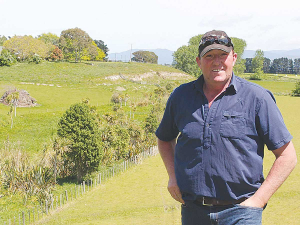Simon Upton urges cross-party consensus on New Zealand environmental goals
Parliamentary Commissioner for the Environment Simon Upton is calling for cross-party consensus on the country's overarching environmental goals.
 Wairarapa farmer Rob Dick on his Eastbro property. Photo Courtesy of the NZ Farm Environmental Trust.
Wairarapa farmer Rob Dick on his Eastbro property. Photo Courtesy of the NZ Farm Environmental Trust.
Wairarapa sheep farmer Rob Dick is on a mission to reduce his property’s environmental footprint as quickly as possible – and his approach starts with the soil.
The actions Rob Dick is taking on his Eastbro farm to manage its carbon footprint earned him an award in the Greater Wellington the 2020 Ballance Farm Environment Awards.
He says an understanding of how land-use impacts climate has led to careful soil and fertiliser management, significant native planting and the installation of extensive drainage.
Dick’s made huge environmental strides while continuing to maintain a highly productive hogget grazing operation and strong community connections.
“It’s a lot of work but when you start seeing results, you quite enjoy the process.”
He believes that respecting soil structure should be a farmer’s top priority, with it ultimately leading to a boost in liveweight gain.
“Soil is the farm’s life really – if you get the soil right, the production and the rest of the farming system will follow suit.”
As such, it’s critical to protect soil from damage such as pugging, and to make careful planting choices.
Eastbro’s soil is predominantly clay, with limited topsoil. In an effort to help fix more nitrate into the farm’s soil, Dick has switched from grass to plantain and red clover. This has resulted in healthier plants, less need for fertiliser and ultimately has boosted lamb growth rates.
“I lamb in October and the plantain is good for producing milk in the ewes – resulting in good weaner weights in a short space of time. Red clover is good for growth rates too, especially on the clay soils,” he explains.
“I’m trying to set up a system that uses different herbs to produce a quick live weight gain before summer comes along and we restock again. It’s also a good idea to look at your stock policy. A lot of farms stick with the status quo and it’s good to challenge that and look at other options.”
Dick believes a good idea for farmers and growers, who want to reduce their carbon footprint, is to divide the property into three profiles – identifying the most productive areas, those that are less used, and any in the middle.
“Identify what you can fix more quickly and get onto that, rather than trying to do the whole farm. It’s also good to identify the weak spots,” he explains. “For example, a lot of my native planting has been done in damp, relatively unused areas.”
Since 2008, Dick has planted more than 8,500 natives in wetland and riparian areas on Eastbro. He has also sought a lot of advice, including from regional council staff, to understand which plants will thrive in certain locations and the type of birdlife they’ll attract.
“In wetland areas, some plants will grow a lot quicker than on dryer areas.
“I’ve planted flax and tussock that are great at soaking up nutrients as well.”
Top tips
● Respect and protect the soil
● Divide your property into different profiles
● Seek advice on planting, particularly from regional councils
● Take time out for yourself and to get involved in the community
A work-life balance
As devoted as he is to Eastbro, Rob Dick also rates the benefits of taking a break and getting involved in the local community.
“I really enjoy seeing the results of giving back to the community – for example, through fundraisers. There are certain times of the year when you know you’ll be a bit quieter and that’s the ideal time to get involved in things,” he says.
“It’s important to get off the farm because you come back with a different attitude, often seeing things with fresh eyes.”
Controls on the movement of fruit and vegetables in the Auckland suburb of Mt Roskill have been lifted.
Fonterra farmer shareholders and unit holders are in line for another payment in April.
Farmers are being encouraged to take a closer look at the refrigerants running inside their on-farm systems, as international and domestic pressure continues to build on high global warming potential (GWP) 400-series refrigerants.
As expected, Fonterra has lifted its 2025-26 forecast farmgate milk price mid-point to $9.50/kgMS.
Bovonic says a return on investment study has found its automated mastitis detection technology, QuadSense, is delivering financial, labour, and animal-health benefits on New Zealand dairy farms worth an estimated $29,547 per season.
Pāmu has welcomed ten new apprentices into its 2026 intake, marking the second year of a scheme designed to equip the next generation of farmers with the skills, knowledge, and experience needed for a thriving career in agriculture.

OPINION: Here w go: the election date is set for November 7 and the politicians are out of the gate…
OPINION: ECan data was released a few days ago showing Canterbury farmers have made “giant strides on environmental performance”.